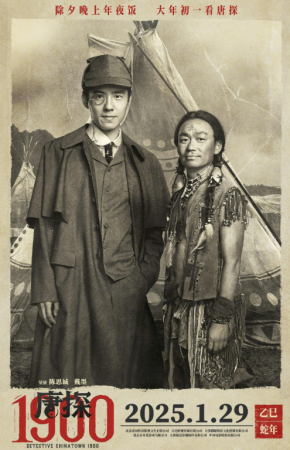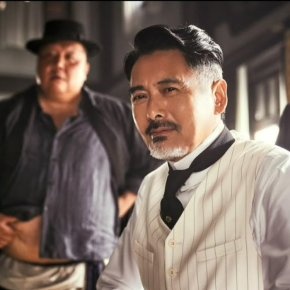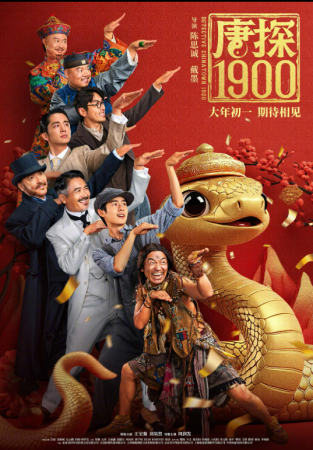Note – some minor spoilers!

Detective Chinatown 1900 (2025) China Film Co., Ltd.
Detective Chinatown 1900 (唐探1900) is a movie within the Detective Chinatown movie franchise, and despite jokes on Reddit about having to watch 1899 movies before this one, Detective Chinatown 1900 is the fourth movie in the series. Each movie has two recurring detective characters played by the young actor Liu Haoran and the older actor Wang Baoqiang. They are all Chinese comedy-mystery buddy films, making them easy to watch with lots of jokes between solving the crime. I haven’t seen the other Detective Chinatown movies, and there is no need; the first three movies are all set in modern times (Bangkok, New York, Tokyo), while the fourth one is set in the past.
One of the reasons I was curious about Detective Chinatown 1900 is that it is set in San Francisco. I’ve been doing a lot of research about San Francisco’s Chinatown in the years 1869-1900 for a xuanhuan fantasy book series I’m writing (the first novel, Ghost Bride of Gum San, came out March 2025), and I wanted to see how the movie portrays this time period. This article will be part of a movie review and part commentary on the environment for Chinese people during this time in history.
The main conflict in the movie is between the Americans, Irish and Chinese people. Alice (Anastasia Shestakova), the daughter of a U.S. Congressman (John Cusack), is murdered along with an elderly Indigenous man. The suspect is Bai Zhenbang (Zhang Xincheng 张新成), the American-born son of Bai Xuanling (Chow Yun-fat 周潤發), who is the leader of Hip Sing Tong, a benevolent gangster organization. Qin Fu (Liu Haoran 刘昊然), a student of a super famous English detective, is asked by Bai Xuanling to clear his son of murder. Ah Gui (Wang Baoqiang 王永强) shows up on a mission to find the murderer of his adopted Indigenous father and teams up with Qin Fu. The two make up a dynamic detective duo, running around Chinatown in search of clues as the murderer continues killing people. The accused, Bai Zhenbang, is an American-born Chinese, and due to increasing anti-Chinese sentiment, the stakes are raised even higher for his case. If he is found to be the murderer, a more substantial Chinese exclusion bill will be passed in Congress, which will evict all Chinese people in Chinatown. There is also an interesting side story about Empress Dowager Cixi sending Manchu officials of the Qing dynasty to capture revolutionaries, which adds to the movie’s complexity.

Detective Chinatown 1900 (2025) China Film Co., Ltd.
Since it’s a comedy murder mystery, the whodunnit plot isn’t very deep, and the performances of the non-Chinese characters are a bit wooden (not uncommon for foreign actors in Asian productions). I was expecting more of John Cusack and was disappointed because his performance was stiff, and the lines felt forced. Or maybe he was doing deadpan acting since he knew it was a comedy movie? I’m not sure. (I couldn’t help but miss Gregory Charles Rivers 河國榮, an Australian actor I saw last in VIU’s Psycho Detective 詭探, who is very natural at playing all the foreign roles in Hong Kong productions.) Chow Yun-fat did a fantastic job along with the two main actors, Liu Haoran and Wang Baoqiang. They were immersed in their characters and delivered their lines ideally to cause laughter or create tension. The Manchu officials were hilarious with their slapstick comedy, representing the rise and fall of China as a country. I was impressed by the effort of doing an East meets West movie with Caucasians speaking Mandarin and Chinese characters speaking English. The dialogue went back and forth in both languages. Admittedly, I was a bit flabbergasted by the murderer being called “Jack the Ripper” since this serial killer is supposed to be based in London, England.
Recently in May 2024, the action film Formed Police Unit’s 维和防暴队 actors Wang Yibo 王一博 (The UnTamed 陈情令, Hidden Blade 无名) and Huang Jingyu (Operation Red Sea 红海行动, Pegasus飞驰人生) faced international backlash for appearing in blackface makeup during some scenes. Detective Chinatown 1900 surprised me with the brownface appearance of actor Yin Zheng, playing a Chinese-Indigenous person. The movie explains that one of the detectives, Ah Gui, lost his parents in a railway explosion, so an Indigenous man adopted him. The broader presumption is that Indigenous people adopted many Chinese children and became part of this tribe, thereby adopting Indigenous dress, language and customs. Historically, both Indigenous and Chinese people were considered outsiders, and the two groups did mix, so it’s not a false narrative. With China’s domestic audience, there isn’t an issue with Chinese actors roleplaying other races, but as international audiences grow, there will be remarks about this.
Detective Chinatown 1900 was shot in Laoling Film Studio (Shandong, China), the most extensive film and television base in north China. This is evident in the movie because San Francisco Chinatown of 1900 looked incredibly clean and spacious compared to reality. Around this time, Chinatown was an extremely cramped place with gambling dens next to opium dens, brothels and general stores. Since this is a Chinese movie, the language used in the film is Mandarin. While some Mandarin-speaking Chinese were in San Francisco during this period, most Chinatown hailed from the Guangdong province of southern China and would have spoken Taishanese or Cantonese. Of all the actors, Chow Yun-fat and Yin Zheng speak Cantonese if the film is ever dubbed, although Yin Zheng mostly spoke gibberish in the movie as part of the comedic dialogue.

Detective Chinatown 1900 (2025) China Film Co., Ltd.
I watched this film with a new immigrant friend from China, and she was shocked at the racism displayed towards the Chinese in the movie. The American and Irish characters kept calling Chinese people “yellow peril” and “chinks” while holding signs saying “Go back to China!” Sadly, this is historically accurate since Chinese people were only supposed to be temporary labourers in America. As the economy declined, Chinese animosity became politicized, and politicians blamed the Chinese for depressed wage levels. The movie mentions the Chinese Exclusion Act several times, a U.S. federal law that was the first and only major federal legislation created for a specific nationality to suspend immigration. In the movie, this Act was stated as a reason for prohibiting a Chinese man from marrying a Caucasian woman, but this is inaccurate. The Act would prevent a Chinese person from becoming a U.S. citizen, limiting their legal rights, including marriage.
However, it is Section 69 of the California Civil Code (enacted in 1880 and remained in effect until 1948) that explicitly prohibits marriages between “Mongolians” (Chinese) and white persons in California. During this period, there were a lot of laws against Chinese people, ranging from Alien Land Laws to prevent Chinese people from owning land to the Scott Act, which banned Chinese who left the U.S. from returning, even if they had legal residency. There were also extra taxes imposed on Chinese miners and bans on using Chinese fishing nets and bamboo poles to carry baskets. The women-to-male ratio in 1900 Chinatown was about nine men for every one woman, and I felt the film showed a lot more women than this. The only woman who had any lines in the film was the victim, Alice; all other women were either victims of the murderer or part of the crowd. I can go on forever about history; below are some links for those interested in reading more.
Detective Chinatown 1900 is an entertaining movie with many comedic laughs, primarily delivered through fantastic Chinese actors. It touches on the difficulties of living as a Chinese person in San Francisco at the time, although reality was much uglier than depicted. The fall of Empress Dowager Cixi didn’t occur until later. Still, to deliver a message about the change in China due to the revolution, the timeline was accelerated for this storyline. Chow Yun-fat delivers the best dialogue in the movie, ranging from funny lines to heartfelt speeches about the oppression of the Chinese in America. This is a good movie choice if you are looking for a light comedy. (Movie rating 7.5/10)
Links about historical San Francisco
US Library of Congress 1885 Map of Chinatown in San Francisco https://www.loc.gov/item/2012593519/
Museum of the City of San Francisco with links to historical articles
https://sfmuseum.org/hist1/index3.html
History Channel short documentary about History of San Francisco’s Chinatown
https://www.history.com/topics/immigration/san-francisco-chinatown
Historical Essay about Men: Women in Early San Francisco
https://www.foundsf.org/index.php?title=Men_:_Women_in_Early_San_Francisco
National Archives – Chinese Exclusion Act (1882)
https://www.archives.gov/milestone-documents/chinese-exclusion-act
Book Links
San Francisco’s Chinatown by Judy Yung
https://www.arcadiapublishing.com/products/9781467116824
The Chinese in America A Narrative History by Iris Chang
https://www.penguinrandomhouse.com/books/288096/the-chinese-in-america-by-iris-chang/
San Francisco Chinatown: A Guide to Its History and Architecture by Choy, Philip P.
https://citylights.com/city-lights-published/san-francisco-chinatown-gt-hist-arch/
Ghost Bride of Gum San by JF Garrard (a xuanhuan fantasy book)
https://www.darkwinterlit.com/post/darkwinter-press-new-release-ghost-bride-of-gum-san-by-jf-garrard